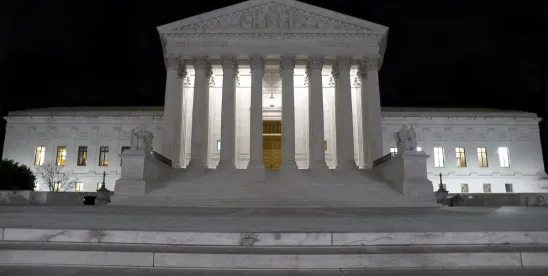As many expected based on the draft opinion that was leaked months ago, the U.S. Supreme Court has held the U.S. Constitution does not protect the right to obtain an abortion. Dobbs v. Jackson Women’s Health Organization, No. 19-1392 (June 24, 2022).
Dobbs overturns nearly 50 years of precedent from the Court’s decision in Roe v. Wade and Planned Parenthood Pennsylvania v. Casey on the issue.
The impact of Dobbs will vary, as states are now at liberty to enforce and create abortion legislation without restrictions arising out of constitutional protections.
What does this mean for employers?
As pressure mounts on this issue, some employers may be considering what, if anything, they can or should do. Many states have enacted legislation that restricts individual abortion rights and potentially third parties who assist individuals who seek abortions. To the extent any state laws were not enforced because of the Court’s holding in Roe or Casey, states can move forward now to implement and enforce those laws.
Laws often referred to as “trigger laws,” those that are in place but unenforceable due to overriding federal restrictions, become enforceable once those federal restrictions are lifted. As a result of Dobbs, abortion-related “trigger laws” previously unenforceable can take effect, creating new standards for individuals and others that will redefine the national abortion law landscape.
Some existing state laws and trigger laws may affect employers and put employers at risk of violating state law if they implement policies to assist employees seeking an abortion or even continue to cover abortions under group health plans. For example, a state law may create liability for anyone who “aids or abets” a person who obtains an abortion. Employers also must be cognizant of how they apply their leave policies, who may seek accommodations based on a sincerely held religious belief, and whether certain provisions of the Pregnancy Discrimination Act apply to women who are seeking or who have had an abortion.
In addition, the Court’s ruling may affect employee benefit plans. Many employers are considering additional benefits for their employees, and their covered dependents, such as travel reimbursement for seeking an abortion outside of the local jurisdiction due to state law restrictions. There are many legal issues to consider in connection with the coverage of abortion-related services under employee benefit plans. (For additional guidance on the issue, see our article, Group Health Plan Considerations in the Face of (Potentially) Changing Abortion Laws.) Depending on how the state laws are enacted, there also may be issues with relying on ERISA preemption provisions to avoid these obligations.
Corporate management and directors should plan for changes and be aware of policies and fiduciary responsibilities. This can include preparing for public and employee reactions (for and against), legislative and law enforcement threats, social media posts, and other employee demonstrations. Pressure from a variety of groups to take a corporate public opinion also may occur.
Whether changes to leave policies, employee benefits, travel reimbursement, or handling accommodation requests, employers considering policies or benefit offerings in response to Dobbs must carefully review and consider federal and state laws, including state abortion-related legislation to evaluate the risk of potential liability.







 />i
/>i

